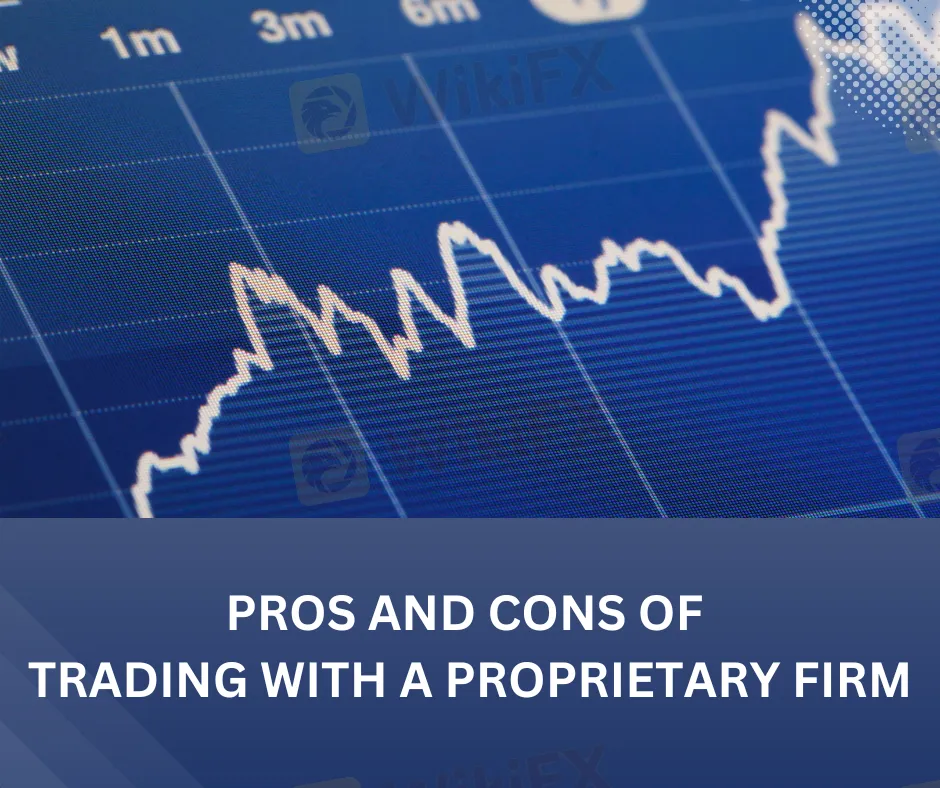简体中文
繁體中文
English
Pусский
日本語
ภาษาไทย
Tiếng Việt
Bahasa Indonesia
Español
हिन्दी
Filippiiniläinen
Français
Deutsch
Português
Türkçe
한국어
العربية
What's Behind the Dramas of Prop Trading Firms?
Abstract:Unveiling the hidden realities of proprietary trading, this article explores the industry's legitimacy challenges, differentiating genuine from fake firms, and outlines the lucrative yet risky nature of participation.

In the dynamic landscape of online trading, proprietary trading firms have emerged as influential players, wielding substantial influence in the financial markets. Behind the scenes, however, lies a realm of unknown secrets that traders and investors must navigate carefully.
Determining the legitimacy of proprietary trading firms is a nuanced task within an industry that operates along a spectrum. Legitimate firms coexist with those that lack transparency and may engage in potentially unethical practices.

Reputable proprietary trading firms stand out for their commitment to cultivating traders' skills and knowledge through structured training programs. These programs offer comprehensive education, ensuring that traders are well-equipped to navigate the complexities of financial markets effectively. In addition to structured training, legitimate prop firms prioritize mentorship as a crucial aspect of their culture. Experienced traders actively engage with and support novice traders, fostering an environment of continuous learning and professional development. Furthermore, genuine prop firms implement profit-sharing models, where traders share a portion of their profits with the firm. This collaborative approach incentivizes both parties to work together for mutual success. Transparency is a cornerstone for legitimate firms, as they operate with clear rules, articulate fee structures, and define profit-sharing arrangements, providing traders with a transparent and fair environment for their financial endeavours.
While the positives highlight the strengths of genuine prop firms, certain red flags warrant careful consideration. Proprietary trading firms that make unrealistic promises, such as guaranteed returns or exorbitant profit-sharing ratios, should be approached with caution, as these claims may be indicative of potentially deceptive practices. Traders should also exercise caution when faced with hidden fees, as legitimate firms are transparent about their fee structures, and excessive upfront costs may signal deceptive practices. Lack of comprehensive training programs is another warning sign, especially if a prop trading firm prioritizes quick recruitment over investing in the development and success of their traders. Lastly, opaque profit-sharing terms can mask unfair practices within a proprietary trading firm. Traders are advised to seek clarity on profit-sharing arrangements to ensure a fair and transparent relationship with the firm.
In navigating the proprietary trading landscape, traders must carefully assess these factors to distinguish between legitimate opportunities for growth and potential pitfalls. By understanding the dynamics of the industry, traders can make informed decisions that align with their goals and values.
Participating in proprietary trading can be a lucrative venture, but it comes with its own set of pros and cons.

Proprietary trading presents several advantages for traders. Firstly, it offers substantial access to capital, empowering traders to execute larger transactions and potentially enhance profits. Additionally, proprietary firms often invest in state-of-the-art technology, affording traders access to sophisticated tools and strategies for a competitive edge. Another notable benefit is the prevalence of performance-based compensation structures in many proprietary firms, aligning the interests of traders with the overall success of the firm. This approach not only fosters a results-driven environment but also ensures that traders are rewarded in proportion to their contributions to the firm's profitability.
Despite its advantages, proprietary trading comes with inherent drawbacks. Firstly, the principle of “high risk, high reward” prevails, as the amplified access to capital also intensifies the potential for significant losses, particularly in volatile markets. Another disadvantage lies in the limited autonomy for traders within proprietary firms, where adherence to the firm's prescribed trading strategies and risk management policies can curtail individual decision-making freedom. Additionally, the variable nature of payouts, although tied to performance-based compensation, can pose a challenge. Traders may experience periods of reduced payouts during market downturns or when their trading strategies fall short of expectations, introducing an element of financial uncertainty.
As the curtain lifts on the behind-the-scenes dramas of proprietary trading firms, traders must navigate a complex landscape. Choosing reputable firms, understanding the intricacies of market legitimacy, and weighing the pros and cons are crucial steps for those venturing into the captivating yet treacherous world of proprietary trading. In this dynamic industry, knowledge is not just power; it is the key to success and financial security.

Disclaimer:
The views in this article only represent the author's personal views, and do not constitute investment advice on this platform. This platform does not guarantee the accuracy, completeness and timeliness of the information in the article, and will not be liable for any loss caused by the use of or reliance on the information in the article.
Read more

WikiFX Broker Assessment Series | Lirunex: Is It Trustworthy?
In this article, we will conduct a comprehensive examination of Lirunex, delving into its key features, fees, safety measures, deposit and withdrawal options, trading platform, and customer service. WikiFX endeavours to provide you with the essential information required to make an informed decision about utilizing this platform.

Italy’s CONSOB Blocks Seven Unregistered Financial Websites
Italy’s CONSOB ordered seven unauthorized investment websites blocked, urging investors to exercise caution to avoid fraud. Learn more about their latest actions.

CySEC Warns Against Unauthorized Investment Firms in Cyprus
CySEC warns investors about unregulated investment firms in Cyprus. Verify broker reliability through the WikiFX app to stay protected from scams.

STARTRADER Issues Alerts on Fake Sites and Unauthorized Apps
STARTRADER warns against counterfeit sites and apps using its brand name. Protect yourself by recognizing official channels to avoid fraudulent schemes.
WikiFX Broker
Latest News
JUST Finance and UBX Launch Multi-Currency Stablecoin Exchange
XM Revamps Website with Sleek Design and App Focus
Global Shift in Cryptocurrency Taxation: Italy and Denmark Chart New Paths
Webull Introduces 24/5 Overnight Trading to Extend U.S. Market Access
TradingView & Mexico’s Uni. Partnership, to Enhance Financial Education
Something You Need to Know About SogoTrade
eToro Launches Global-Edge Smart Portfolio: A Balanced Approach to Growth and Stability
Darwinex advises traders to update MT4 & 5
Revolut X Expands Crypto Exchange Across Europe, Targeting Pro Traders
Broker Review: Is Exnova Legit?
Currency Calculator


